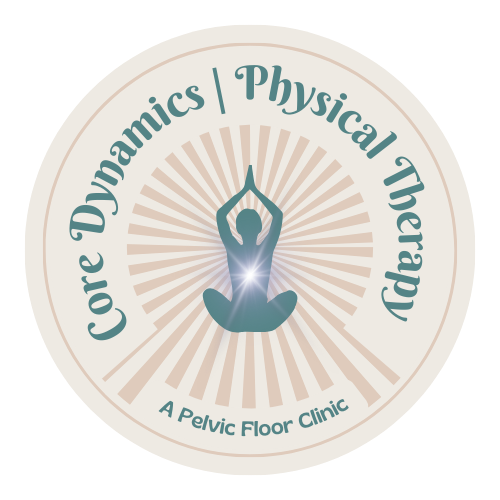 As a mother of two, and having the clinical experience of treating postpartum moms every day, I can say I have some advice to all new mom’s and moms to be:) All moms know we will do anything for our children, but when was the last time we did something for ourselves? Check out the self-care blog (https://coredynamicspt.com/2018/04/16/self-care-by-niva-herzig-pt/ )by Niva Herzig, PT. I am the same way too, but I see the moms who don’t set aside time for “self-care” come in to our clinic with prolapse and leakage in their 50’s, 60’s and 70’s. The little dribble when you jump when you cough or the heaviness after holding the baby all day, won’t reverse with time…so why let it progress? Let’s learn about your new body. By being educated, knowing what to expect you CAN get your body back (and even better than beforeJ)! Let’s first begin with establishing norms:
As a mother of two, and having the clinical experience of treating postpartum moms every day, I can say I have some advice to all new mom’s and moms to be:) All moms know we will do anything for our children, but when was the last time we did something for ourselves? Check out the self-care blog (https://coredynamicspt.com/2018/04/16/self-care-by-niva-herzig-pt/ )by Niva Herzig, PT. I am the same way too, but I see the moms who don’t set aside time for “self-care” come in to our clinic with prolapse and leakage in their 50’s, 60’s and 70’s. The little dribble when you jump when you cough or the heaviness after holding the baby all day, won’t reverse with time…so why let it progress? Let’s learn about your new body. By being educated, knowing what to expect you CAN get your body back (and even better than beforeJ)! Let’s first begin with establishing norms:
- 1-Postpartum sex may hurt
- 2-Moms may leak on the trampoline
- 3-The pregnancy look is foreverL….until my tummy tuck
- 4-Prolapse occurs in 50% of postpartum women
- 5-Hormonal changes: vaginal dryness
- 6-Reduced sensation with sex
And yes, I’ll agree on the above, they are all super common, every postpartum mom comes in with at least one, if not a few of these complaints, thinking they are the only one in the world with this issue, and that the universe is about to collapse because of it. While these may be common and typical postpartum changes, it doesn’t mean it’s NORMAL. There are a specialized group of providers AKA pelvic floor physical therapists that are there just for YOUR CARE! Pelvic floor therapists educate and help the patient correct the use of their pelvic floor all WITHOUT MEDICATION or SURGERY (and btw not just with KegelsJ)! This allows them to return to the gym, being able to train better and maximize their workouts. As physical therapists, we can assess the pelvic floor and bring its function to coordinate with the rest of the body during both everyday tasks and recreational activity.
For simplicity, lets categorize postpartum changes into 2 general categories. Group A is the postpartum moms that present with pain and restricted mobility of vaginal tissues from a traumatic delivery and perineal scarring. Group B are the moms that present with weakness and laxity of the pelvic floor muscles and complain of leakage and pelvic heaviness. And of course, life is never that simple, and there is a Group C, which are moms who present with characteristics from both group A and B and need a delicate balance of lengthening and strengthening. Each group has its own treatment approach, group A focuses on hands on manual treatment, breathing and stretching, while group B focuses more on pelvic floor exercises. Many women try to self-treat with dilators to vaginal weights, but they all always land up in my office! More Kegels is not the answer. A pelvic floor therapist will create a customized program to address muscle timing and coordination as well as appropriate muscular and myofascial release. The manual therapy, neuro re-education, and targeted exercise program are more specific than any release tool.
Other common issues women experience postpartum is related to perineal care, read more on our Hygiene blog (https://coredynamicspt.com/2018/01/14/hygiene-by-niva-herzig-pt/). From feeling dry to pain with sitting, there are products out there to make your life more comfortable read more on Our Faves blog (https://coredynamicspt.com/2018/01/18/some-of-our-faves-a-resource-guide/), but that is not to say products will fix you (again!).
And for the Mom’s who had a c-section don’t think your exempt! Your pelvic floor still went through a strain holding a baby throughout your pregnancy as well, so bladder issues may present. I see countless women secondary to pain or hypersensitivity at the c-section scar as well as for diastasis recti abdominis (DRA). DRA may be present postpartum whether you delivered c-section or vaginal.
So, after reading this, I am certain you are convinced. Don’t let the “norms” of being a mom be. It’s NOT NORMAL. Moms can exercise without sanitary pads, sex can be better, and can have a stronger core; reducing back pain…that of course takes some self -careJ Treat yourself, and maybe not even treat, view it as a medical obligation to your body and get the care you need from a specialized pelvic floor therapist.
